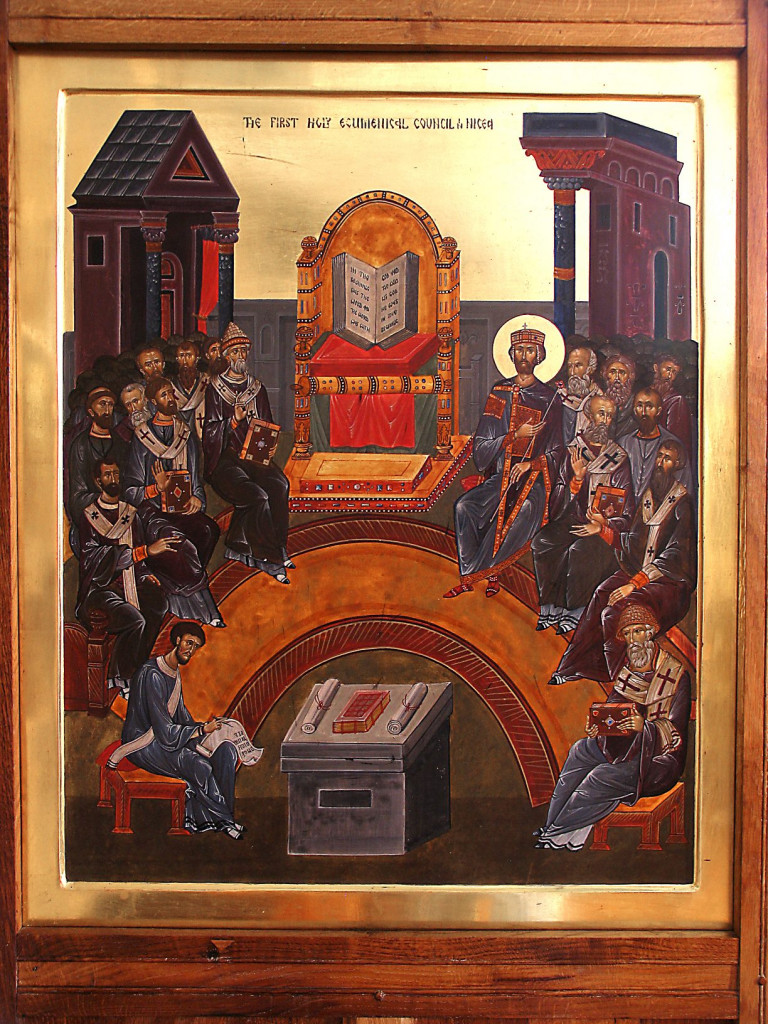The 318 Holy Fathers of the First Ecumenical Council of Nicaea

The Sixth Sunday after the Great Feast of All-Holy Pascha is observed by the Orthodox Church as the Sunday of the Holy Fathers of the First Ecumenical Council. This day commemorates the 318 God-bearing Fathers who gathered in the city of Nicaea in 325 A.D. at the request of the Emperor, Saint Constantine the Great, to address the heresy of Arianism together with other issues that concerned the unity of the Church.
The Commemoration of the First Ecumenical Council has been celebrated by the Church of Christ from ancient times. The Lord Jesus Christ left the Church a great promise, “I will build My Church, and the gates of hell shall not prevail against it” (Mt. 16:18). Although the Church of Christ on earth will pass through difficult struggles with the Enemy of salvation, it will emerge victorious. The holy martyrs bore witness to the truth of the Saviour’s words, enduring suffering and death for confessing Christ, but the persecutor’s sword is shattered by the Cross of Christ.
Persecution of Christians ceased during the fourth century, but heresies arose within the Church itself. One of the most pernicious of these heresies was Arianism. Arius was a protopresbyter of the Church of Alexandria, and in 315 A.D., he began to blaspheme against the Son of God saying that He was not the True God, of one essence with the Father, but rather a work or creation of God and different from the essence and glory of the Father. He also taught that the Son of God had a beginning.
A local Council, convened with Patriarch Alexander of Alexandria presiding, condemned the false teachings of Arius. However, Arius would not submit to the authority of the Church. He wrote to many bishops, denouncing the decrees of the local Council. He spread his false teaching throughout the East, receiving support from certain Eastern bishops.
Investigating these dissentions, the holy emperor Constantine (May 21) consulted Bishop Hosius of Cordova (Aug. 27), who assured him that the heresy of Arius was directed against the most fundamental dogma of Christ’s Church, and so he decided to convene an Ecumenical Council. In the year 325, 318 bishops representing Christian Churches from various lands gathered together at Nicea.
Among the assembled bishops were many confessors who had suffered during the persecutions, and who bore the marks of torture upon their bodies. Also participating in the Council were several great luminaries of the Church: Saint Nicholas, Archbishop of Myra in Lycia (December 6 and May 9), Saint Spyridon, Bishop of Tremithos (December 12), and others venerated by the Church as holy Fathers.
With Patriarch Alexander of Alexandria came his deacon, Athanasius [who later became Patriarch of Alexandria (May 2 and January 18)]. He is called “the Great,” for he was a zealous champion for the purity of Orthodoxy. In the Sixth Ode of the Canon for today’s Feast, he is referred to as “the thirteenth Apostle.”

The emperor Constantine presided over the sessions of the Council. In his speech, responding to the welcome by Bishop Eusebius of Caesarea, he said, “God has helped me cast down the impious might of the persecutors, but more distressful for me than any blood spilled in battle is for a soldier, is the internal strife in the Church of God, for it is more ruinous.”
Arius, with seventeen bishops among his supporters, remained arrogant, but his teaching was repudiated and he was excommunicated from the Church. In his speech, the holy deacon Athanasius conclusively refuted the blasphemous opinions of Arius. The heresiarch Arius is depicted in iconography sitting on Satan’s knees, or in the mouth of the Beast of the Deep (Rev. 13).
The Fathers of the Council declined to accept a Symbol of Faith (Creed) proposed by the Arians. Instead, they affirmed the Orthodox Symbol of Faith:
“We believe in one God. The Father Almighty. The maker of heaven and earth, and of all things visible and invisible. And in one Lord Jesus Christ, the Son of God, the Only-begotten, begotten of the Father before all ages. Light of Light; True God of True God; begotten not made; of one essence with the Father, by Whom all things were made; Who for us men and for our salvation came down from heaven, and was incarnate of the Holy Spirit and the Virgin Mary, and became man. And He was crucified for us under Pontius Pilate, and suffered, and was buried. And the third day He rose again according to the Scriptures, and ascended into heaven, and sits at the right hand of the Father, and He shall come again with glory to judge the living and the dead; whose Kingdom shall have no end.”
Saint Constantine asked the Council to insert into the text of the Symbol of Faith the word “ὁμοούσιον” (of one essence) which he had heard in the speeches of the bishops. The Fathers of the Council unanimously accepted this suggestion.
In the Nicean Creed, the holy Fathers set forth and confirmed the Apostolic teachings about Christ’s divine nature. The heresy of Arius was exposed and repudiated as an error of haughty reason.
After resolving this chief dogmatic question, the Council also issued Twelve Canons on questions of churchly administration and discipline. Also decided was the date for the celebration of Holy Pascha. By decision of the Council, Holy Pascha should not be celebrated by Christians on the same day with the Jewish Passover, but on the first Sunday after the first full moon of the vernal equinox (which occured on March 22 in 325).